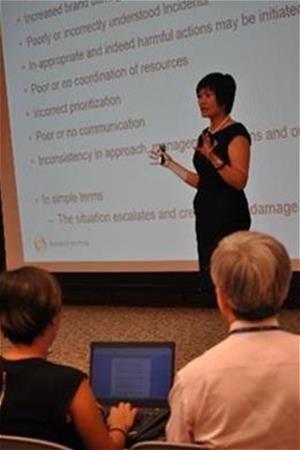Customers should be the key focus when managing major incidents, according to Ms Mayda Lim at the latest IT Service Management Community of Practice (CoP) forum.
“Major incident management is about reducing customer pain and brand damage.” That is the crux of the matter, summed up aptly by Ms Mayda Lim, Head of Implementation & Support, Thomson Reuters at the second IT Service Management Community of Practice (CoP) Forum, held on 24 April 2014 at NUS-ISS.
Speaking to a crowd of 60 IT professionals, Ms Lim iterated that it is important to have a back-up system for everything, “Everything has to be in pairs, in order to ensure service continuity. If one is down, the partner system will kick in automatically. “
 Having different levels of incident management is crucial. “At Thomson Reuters, when an incident is beyond the point of recovery, we will bring it to the Incident Control Centre (ICC). An incident is considered major when there is complete or partial service failure and when there is an extreme impact on the business,” shared Ms Lim.
Having different levels of incident management is crucial. “At Thomson Reuters, when an incident is beyond the point of recovery, we will bring it to the Incident Control Centre (ICC). An incident is considered major when there is complete or partial service failure and when there is an extreme impact on the business,” shared Ms Lim.
An Incident Control Centre is a clear focal point accountable for coordinating efforts to manage major incidents, as well as ensuring clear and concise customer communication. It operates all round the clock as when there’s a need as. It is essential to escalate the issue appropriately whether it is day or night. “When a major incident occurs, there are three key actions to take – communicate to stakeholders, escalate for recovery and prioritise key activities,” said Ms Lim.
She highlights that the benefits of ICC are that it’s customer-focused and establishes effective communication. Its consistent approach and methodology ensures that appropriate resources are guided and focused, and it manages risks associated with major incidents. Should an ICC not be called in time, inappropriate actions may be inadvertently initiated that, in the worst case scenario, increase customer pain and brand damage.
Ms Mayda Lim, speaking at the event
“Brand damage is beyond any monetary damage caused in a major incident, “Ms Lim emphasised, “therefore you need to inform your customers when there are service interruptions, and also inform your customers when you are doing a good job. Customers must have the same visibility as the internal team.”
“We may be certified from an ISO perspective. But the question we need to ask is, are we really reducing customer pain?”
It should be noted that the norm is for the number of incidents to surge after upgrades or new applications are implemented. Care should be taken to avoid such incidents in the first place but if they do occur, then it is important to get everyone who’s involved to do a post-incident review and to identify the recovery path, as Ms Lim concluded.
During the Q&A segment, a member of the audience asked Ms Lim on the challenges in setting up such a rigorous process for Small & Medium-sized enterprises (SME), to which she replied, “The biggest challenge is in bringing about a mindset change. It’s important [for Subject Matter Experts] to get buy-in from management and provide training to increase IT awareness across the organisation.”
Ms Mayda Lim is an experienced IT professional specializing in areas of designing, implementing and adapting a holistic IT service management framework and IT best practices. She is certified in ITIL Service Manager (Masters) level, and is the founder of itSMF Singapore Chapter. To view her slides for the forum, please click here.
The IT Service Management Community of Practice (ITSM CoP) Forum is a community for professionals involved in IT service management to share their knowledge and experience so as to encourage learning and support for one another through a vibrant network of practitioners. Click here to join the LinkedIn group.
The first Forum was shared by Mr Richard Browne, Senior IT Service Management Consultant, CloudFX Pte Ltd. To view the slides, please click here.
For more information on NUS-ISS IT Service Management courses and seminars, please visit
our course finder.
This article is first published in NUS-ISS quarterly e-newsletter, Issue 7 (Jul-Sep 2014).